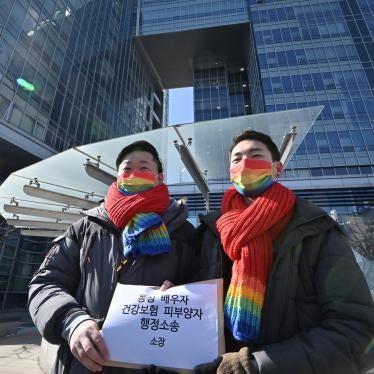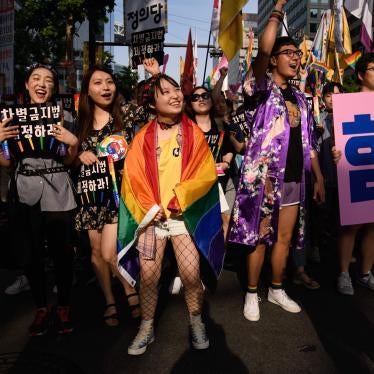On July 18, South Korea’s Supreme Court issued a landmark ruling affirming that the country’s National Health Insurance Service (NHIS) must extend dependent benefits to same-sex partners.
The plaintiff in the case, So Sung-uk, was registered by his partner, Kim Yong-min, as a dependent to obtain employer health insurance benefits. The NHIS accepted So as a dependent, but later revoked that status when it was publicly reported that the NHIS had recognized a same-sex couple.
The Seoul High Court ruled in the couple’s favor in 2023, but the NHIS appealed that decision to the Supreme Court.
Human Rights Watch submitted an amicus brief to the Supreme Court in advance of their decision, arguing that the exclusion of same-sex couples was discriminatory and violated international human rights law. The brief detailed international and regional precedents highlighting a state’s responsibility to recognize and protect same-sex relationships, the lack of such protections in South Korea, and the growing recognition of same-sex relationships in Asia and the Pacific Islands.
In its decision, the Supreme Court affirmed the High Court’s ruling and said that excluding same-sex couples from dependent benefits violated their right to equality as well as their privacy, dignity, and right to pursue happiness.
While the case specifically involved health insurance benefits, the decision provides significant support for same-sex couples seeking access to other state benefits that are currently extended to heterosexual couples who are married or recognized as de facto married, but continue to be withheld from same-sex couples.
South Korea’s lawmakers now have an opportunity to embrace the logic and values of the decision by acting to address the discriminatory treatment of lesbian, gay, bisexual, and transgender (LGBT) people in the country. By enacting comprehensive antidiscrimination legislation and creating a framework to recognize and protect same-sex partnerships, lawmakers would be making significant strides in ensuring that LGBT people can more fully participate in social and economic life without discrimination.










